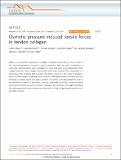Osmotic pressure induced tensile forces in tendon collagen
Author(s)
Masic, Admir; Bertinetti, Luca; Schuetz, Roman; Chang, Shu-Wei; Metzger, Till Hartmut; Fratzl, Peter; Buehler, Markus J; ... Show more Show less
DownloadMasic-2015-Osmotic Pressure.pdf (1.207Mb)
PUBLISHER_CC
Publisher with Creative Commons License
Creative Commons Attribution
Terms of use
Metadata
Show full item recordAbstract
Water is an important component of collagen in tendons, but its role for the function of this load-carrying protein structure is poorly understood. Here we use a combination of multi-scale experimentation and computation to show that water is an integral part of the collagen molecule, which changes conformation upon water removal. The consequence is a shortening of the molecule that translates into tensile stresses in the range of several to almost 100 MPa, largely surpassing those of about 0.3 MPa generated by contractile muscles. Although a complete drying of collagen would be relevant for technical applications, such as the fabrication of leather or parchment, stresses comparable to muscle contraction already occur at small osmotic pressures common in biological environments. We suggest, therefore, that water-generated tensile stresses may play a role in living collagen-based materials such as tendon or bone.
Date issued
2015-01Department
Massachusetts Institute of Technology. Department of Civil and Environmental Engineering; Massachusetts Institute of Technology. Laboratory for Atomistic and Molecular MechanicsJournal
Nature Communications
Publisher
Nature Publishing Group
Citation
Masic, Admir, Luca Bertinetti, Roman Schuetz, Shu-Wei Chang, Till Hartmut Metzger, Markus J. Buehler, and Peter Fratzl. “Osmotic Pressure Induced Tensile Forces in Tendon Collagen.” Nature Communications 6 (January 22, 2015): 5942.
Version: Final published version
ISSN
2041-1723